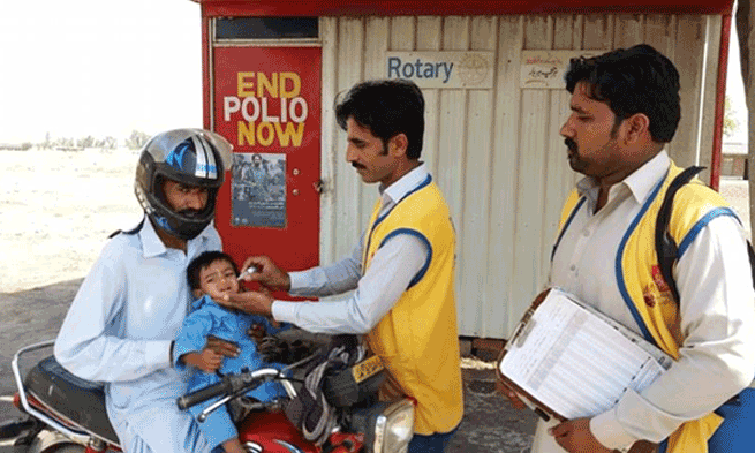
International donors have played a pivotal role in polio eradication efforts around the world. In 1988, when the Global Polio Eradication Initiative began, polio paralyzed more than 1,000 children every day. Now, attributing to joint efforts of the global world, UN agencies and international donors, global incidence of polio cases has decreased by 99%, with only 37 cases reported globally last year.
One of the most important partner and donor in this global initiative has been Rotary International which initiated a worldwide effort to eradicate polio in 1985 by starting the PolioPlus campaign. In 1988, Rotary was joined in the effort by WHO, the U.S. Centers for Disease Control, UNICEF, and more recently the Bill & Melinda Gates Foundation, to create the Global Polio Eradication Initiative (GPEI). In Pakistan, various initiatives are currently being implemented with support of Rotary International. These include supporting Supplementary Immunization Activities (SIAs) in high risk Union Councils, transport for vaccination teams working with mobile populations, maintenance and strengthening of permanent polio vaccination transit points and various community level activities.
In January 2017, as part of community activation, a water filter plant was installed and inaugurated in Gulshan-e-Iqbal, a densely populated area in Karachi. Inaugurating the plant, Rotary Ulema Committee chairman Haji Hanif Tayyab said: “Rotary international is committed to eradicate polio from Pakistan and for that we will not limit ourselves to only providing financial support but will support all initiatives in every way possible to build and strengthen community support during immunization campaigns.”
Karachi, being the largest city of Pakistan and seventh largest in the world, inhabits a population of about 24 million people. It is also the capital of Sindh province, attracting hundreds and thousands of families, moving round the year. Sindh borders with both Punjab and Balochistan provinces, therefore High Risk Mobile Population keeps moving in and out of the province. This increases the instance of children being missed for polio vaccination, thus becoming carriers of the wild poliovirus .
To prevent and interrupt circulation of polio virus, from one province to another and from one city to another, permanent transit points (PTPs) were established with support from Rotary international at international and inter-provincial borders. With time, it was also realized that harsh weather and security conditions make it extremely difficult for vaccination teams to continue work round the clock. To address this and facilitate the teams posted at PTPs, Rotary international also provided containers for shelter.
“Some of us work day and night at various transit points and until now it was very hard for us to work without any shelter,” says Barkatshar, a local vaccinator, posted on inter-provincial transit point of District Ghotki between Sindh and Punjab province. “We are very happy to have received these shelters. They are not only our protection against harsh weather but are also a source of security,” he adds smilingly.
